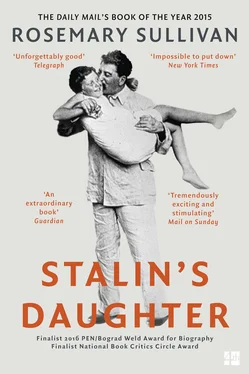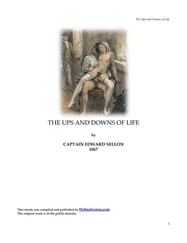Her laconic humor helped. She could say, “I don’t any longer have the pleasant illusion that I can be free of the label ‘Stalin’s daughter.’ . . . You can’t regret your fate, though I do regret my mother didn’t marry a carpenter.” 2She spent most of her forty-four years in the West as a nomad, moving over thirty times, even briefly defecting back to the Soviet Union.
She was called unstable. The historian Robert Tucker remarked that “despite everything, she was, in some sense, like her father.” 3And yet it’s astonishing how little she resembled her father. She did not believe in violence. She had a risk taker’s resilience, a commitment to life, and an unexpected optimism, even though her life spanned the brutalities of the twentieth century in the most heartrending of ways, giving her a knowledge of the dark side of human experience, which few people are ever forced to confront. Caught between two worlds in the Cold War power struggles between East and West, she was served well by neither side. She had to slowly learn how the West functioned. The process of her education is fascinating and often sad.
Alliluyeva had as much trouble explaining her father as anyone else did. Her attitude toward Stalin was paradoxical. She unequivocally rejected his crimes, yet he was the father who, in her childhood memory, was loving—until he wasn’t. She sought, with only partial success, to understand what motivated his brutal policies. “I don’t believe he ever suffered any pangs of conscience; I don’t think he ever experienced them. But he was not happy, either, having reached the ultimate in his desires by killing many, crushing others, and being admired by some.” 4
However, she warned that to dismiss him as simply monstrous would be a grave error. The question is what happens to a human being in his private life and within a particular political system that dictates such a history. She always insisted that her father never acted alone. He had thousands of accomplices.
Svetlana Alliluyeva imagined that in the West she could construct a private life as a writer and find someone with whom she could share it. Despite valiant efforts, she believed she had failed, though others are not so sure. It’s astonishing that she survived at all.
At 7:00 p.m. on March 6, 1967, a taxi drew up to the open gates of the American Embassy on Shantipath Avenue in New Delhi. Watched carefully by the Indian police guard, it proceeded slowly up the circular drive. The passenger in the backseat looked out at the large circular reflecting pool, serene in the fading light. A few ducks and geese still floated among the jets of water rising from its surface. The embassy’s exterior walls were constructed of pierced concrete blocks, which gave the building a light, airy look. The woman noted how different this was from the stolid institutional Soviet Embassy she had just left. So this was America.
Svetlana Alliluyeva climbed the wide steps and stared at the American eagle embedded in the glass doors. All the important decisions of her life had been taken precipitately. Once she crossed this threshold, she knew that her old life would be irrevocably lost to her. She had no doubt that the wrath of the Kremlin would soon fall on her head. She felt defiant. She felt terrified. She’d made the most important decision of her life; she’d escaped, but into what she had no idea. She did not hesitate. Clutching her small suitcase in one hand, she rang the bell.
Danny Wall, the marine guard on desk duty, opened the door. He looked down at the small woman standing before him. She was middle-aged, neatly dressed, nondescript. He was about to tell her the embassy was closed when she handed him her passport. He blanched. He locked the door behind her and led her to a small adjacent room. He then phoned Robert Rayle, the second secretary of the embassy, who was in charge of walk-ins—defectors. Rayle had been out, but when he returned the call minutes later, Wall gave him the secret code indicating the embassy had a Soviet defector, the last thing Rayle was expecting on a quiet Monday evening in the Indian capital.
When Rayle arrived at the embassy at 7:25, he was pointed to a room where a woman sat talking with Consul George Huey. She turned to Rayle as he entered, and almost the first thing she said to him was: “Well, you probably won’t believe this, but I’m Stalin’s daughter.” 1
Rayle looked at the demure, attractive woman with copper hair and pale blue eyes who stared steadily back at him. She did not fit his image of Stalin’s daughter, though what that image was, he could not have said. She handed him her Soviet passport. At a quick glance, he saw the name: Citizeness Svetlana Iosifovna Alliluyeva. Iosifovna was the correct patronymic, meaning “daughter of Joseph.” He went through the possibilities. She could be a Soviet plant; she could be a counteragent; she could be crazy. George Huey asked, nonplussed, “So you say your father was Stalin? The Stalin?” 2
As the officer in charge of walk-ins from the Soviet bloc, Rayle was responsible for confirming her authenticity. After a brief interview, he excused himself and went to the embassy communications center, where he cabled headquarters in Washington, demanding all files on Svetlana Iosifovna Alliluyeva. The answer came back one hour later: “No traces.” Headquarters knew nothing at all about her—there were no CIA files, no FBI files, no State Department files. The US government didn’t even know Stalin had a daughter. 3
While he waited for a response from Washington, Rayle interrogated Svetlana. How did she come to be in India? She claimed that she had left the USSR on December 19 on a ceremonial mission. The Soviet government had given her special permission to travel to India to scatter the ashes of her “husband,” Brajesh Singh, on the Ganges in his village—Kalakankar, Uttar Pradesh—as Hindu tradition dictated. She added bitterly that because Singh was a foreigner, Aleksei Kosygin, chairman of the Council of Ministers, had personally refused her request to marry him, but after Singh’s death, she was permitted to carry his ashes to India. In the three months she’d spent here, she’d fallen in love with the country and asked to be allowed to stay. Her request was denied. “The Kremlin considers me state property,” she said with disgust. “I am Stalin’s daughter!” She told Rayle that, under Soviet pressure, the Indian government had refused to extend her visa. She was fed up with being treated like a “national relic.” She would not go back to the USSR. She looked firmly at Rayle and said that she had come to the American Embassy to ask the US government for political asylum. 4
So far, Rayle could conclude only that this utterly calm woman believed what she was saying. He immediately understood the political implications if her story was true. If she really was Stalin’s daughter, she was Soviet royalty . Her defection would be a deep psychological blow to the Soviet government, and it would make every effort to get her back. The American Embassy would find itself in the midst of a political maelstrom. 5
Rayle remained suspicious. He asked her why her name wasn’t Stalina or Djugashvili, her father’s surname. She explained that in 1957 she had changed her name from Stalina to Alliluyeva, the maiden name of her mother, Nadezhda, as was the right of every Soviet citizen.
He then asked where she had been staying. “At the Soviet Embassy guesthouse,” she replied, only several hundred yards away. How had she managed to slip away from the Soviet Embassy without being noticed? he asked. “They are having a huge reception for a visiting Soviet military delegation and the rest of them are celebrating International Women’s Day,” she replied. He then asked her how much time she had before her absence at the guesthouse would be noticed. She might have about four hours, she explained, since everyone would be drunk. Even now she was expected at the home of T. N. Kaul, the former Indian ambassador to the USSR. She said in sudden panic: “I really have to call his daughter, Preeti, to let her know I’m not coming.” 6
Читать дальше











![John Bruce - The Lettsomian Lectures on Diseases and Disorders of the Heart and Arteries in Middle and Advanced Life [1900-1901]](/books/749387/john-bruce-the-lettsomian-lectures-on-diseases-and-disorders-of-the-heart-and-arteries-in-middle-and-advanced-life-1900-1901-thumb.webp)
